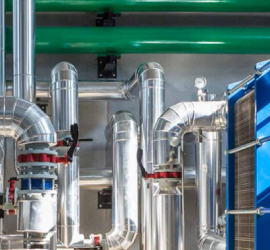
Testing, inspection and certification of the safety and quality of any given product, process or installation are vital to ensure an item is able to do the job it has been designed for and is not going to fail and cause disruption.
Creating Value through independent certification
As companies’ supply chains become lengthier and more complex, the need for independent certification of a product’s quality and safety is clear. Outside inspection helps guarantee health, safety and environmental protection are met, reducing the risk of failure. Furthermore, the 2015 Paris Agreement, the United Nations’ 17 Sustainable Development Goals and the European Union’s action plan for the circular economy have set out new requirements and targets for companies to observe.

All the benefits

But how much of a contribution does the testing, inspection and certification sector – known as TIC -- really make to growth, safety, the environment and sustainability. What is quality worth to the country? Accredia, the Rome-based non-profit that oversees the TIC industry on behalf of the Italian government, has attempted to answer the question.
An increasing of revenue
A specific study Accredia carried out jointly with Prometeia, a consultancy, found a contribution to growth of 10.8 billion euro between 2013 and 2018, accounting for more than 16% of the increase in the size of the national economy.
Of this, 5 billion euro came from manufacturing companies, 5.8 billion euro from the services sector and 110 million euro from construction.
Moreover, service-sector companies that got their management systems certified to the ISO 9001 standard increased their revenue by an extra 3.9% in the year of certification and by as much as 8% from the second year, with further gains coming if combined with other standards. Longer term, the study found greater benefits, with companies that were certified between 2005 and 2007 showing additional sales of as much as 18% over non-certified rivals when analyzed 10 years later.
More company safety
Companies with ISO 45001 certification are also safer than those without, offering a further saving for the national economy by avoiding the economic impact of accidents. In 2016, work-related accidents and illnesses cost more than 104 billion euro, equivalent to 6.3% of economic output, according to the report.
In 2019, there were an estimated 6,000 fewer accidents at certified companies, a saving of 350 million euro, of which 50 million benefitted the certified companies and 300 million the collectivity. Certification of companies in the food chain also prompted a declining rate of foodborne diseases and the social costs linked to them.
Business growth
There are several possible explanations for the benefits of certification, according to the report. They include spreading technical knowledge and international best practices internally, with advantages for productivity and quality. There is also the ability to access international markets that certification brings, with the resulting opportunities to boost sales, and greater attention paid to quality and safety of the goods or services produced. Finally, there is the element of reassurance for the consumer offered by adherence to a standard.

Environmental benefits
More than 20,000 Italian companies have some form of environmental certification, meaning that they have lower emissions, better waste management, and pollute less than those without. Regarding greenhouse gas emissions in particular, a sample of more than 4,900 ISO 14001 certified companies in 28 sectors, and representing 16% of the economy in 2018, reduced emissions by an average of 6.9% across all sectors – 14% for the energy industry – a saving of 7.6 million tonnes of CO2 in a single year. The report also estimates that companies offering energy certification to their clients have helped reduce energy consumption by an average of about 1% a year since 1983.
While part of that is due to tighter regulation, between 2009 and 2018 there was a further reduction of 1.7%. In 2018, that meant about 6 million tonnes of CO2 equivalent were saved, in monetary terms worth as much as 403 million euro. Certification benefits everyone involved, from the company obtaining the certification, to its customer and its staff, to society as a whole, helping move business in the direction of greater efficiency in its use of resources and greater sustainability.







